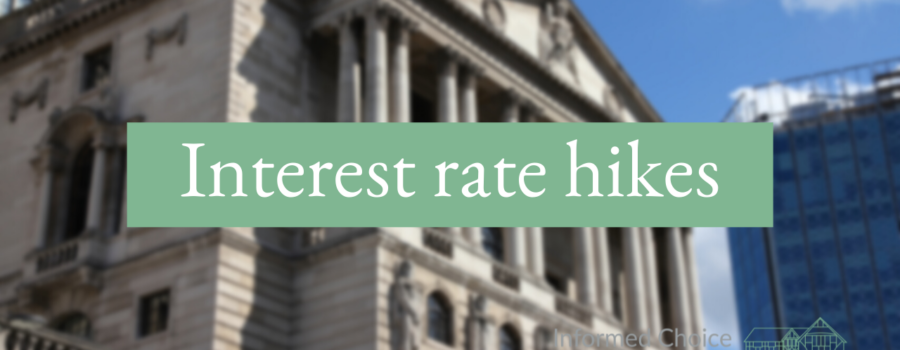There is a pretty good chance that the Bank of England will put up interest rates, again, at their Monetary Policy Committee (MPC) meeting next Thursday.
Financial markets have priced in a 95% chance of a rate hike from 0.25% to 0.5% when the MPC gets together for their February meeting.
After that, the markets believe there will be a further three interest rate rises in 2022, ultimately resulting in a Bank Rate of 1.25%.
Should these expectations materialise, it would mean that interest rates end the year at their highest level since February 2009, shortly before a series of rate cuts in response to the global financial crisis.
However, investors should always take these market-based predictions with a pinch of salt.
Last Autumn, the financial markets were almost certain an interest rate rise would materialise, but the Bank of England kept rates on hold at their historic low of 0.1%.
Laith Khalaf, head of investment analysis at AJ Bell, said:
“It’s not just in the US where the prospects for tighter monetary policy are escalating, markets are also expecting a significant number of rate hikes in the UK this year. A rate rise at the Bank’s February meeting is all but inked in, which if realised would be the first time since 2004 that the bank has raised interest rates in two consecutive meetings.
“Rampant inflation is of course the reason markets are now expecting the Bank of England to start pressing on the monetary policy brakes. It’s a startling sign of how dramatically the economic outlook has changed in the last twelve months to consider that this time last year, the rate setting committee was talking about a negative base rate in the UK. Fast forward to 2022, and the market is thinking four rate rises could materialise this year alone.
“This would be a paradigm shift for investors, businesses and consumers, all of which have become accustomed to a prolonged period of extremely accommodative monetary policy. Indeed we estimate that 10 million people in the UK haven’t seen a base rate above 1% in their entire adult lives. Little wonder then, that markets are getting in a bit of a tailspin about what rising interest rates might mean for stocks and bonds.
“The Chancellor might also be squirming in his seat. Higher base rate will mean the Exchequer needs to pay significantly more interest on the £875 billion of gilts held in the QE scheme, and that could have significant implications for the viability of any largesse the Chancellor might like to indulge in at the March Budget.”
Assuming the financial markets have got it right on this occasion, a higher cost of borrowing will contribute to the existing cost of living squeeze.
With energy bills due to increase by as much as 50% in April, when the OFGEM energy price cap is revised, and the introduction of higher National Insurance rates, life is becoming increasingly expensive.
How will the financial markets react to rising interest rates?
To a large extent, we expect equity markets to have priced in this expectation, along with forecasts of slowing global economic growth.
It seems unlikely that UK or global equity markets will be particularly spooked by a Bank of England decision to further hike rates, although never say never, especially in terms of short-term reactions.

